Digitally Inclusive Healthy Ageing Communities (DIHAC) in Republic of Korea 2024
Juntendo University, Department of Global Health Research, Associate Professor Dr. Myo Nyein Aung, Principal Investigator of DIHAC study, visited Republic of Korea on the 1st and 2nd week of January, 2024. Digitally Inclusive Healthy Ageing Communities (DIHAC) is a cross-cultural study being conducted in Japan, Republic of Korea, Singapore and Thailand since 2021, the start of Healthy Ageing Decade. Professor Myo visited Yonsei University, Maire campus, Yonsei Global Health Center, “Little Library” in Heungup Town, which is the center of social prescribing project, and Seeking Dream Church, Wonju, Saje Primary Health Care Post, Gangwon Health Co-operative, Wonju to conduct the Phase 3 qualitative inquiries of the DIHAC study. In Seoul, he was invited by Naver Corporation Headquarters, and SMD solutions Corp., Seoul National University School of Dentistry to collaborate and observe Republic of Korea’s cutting-edge digital technologies for digital inclusion of older adults and healthy ageing in the community.
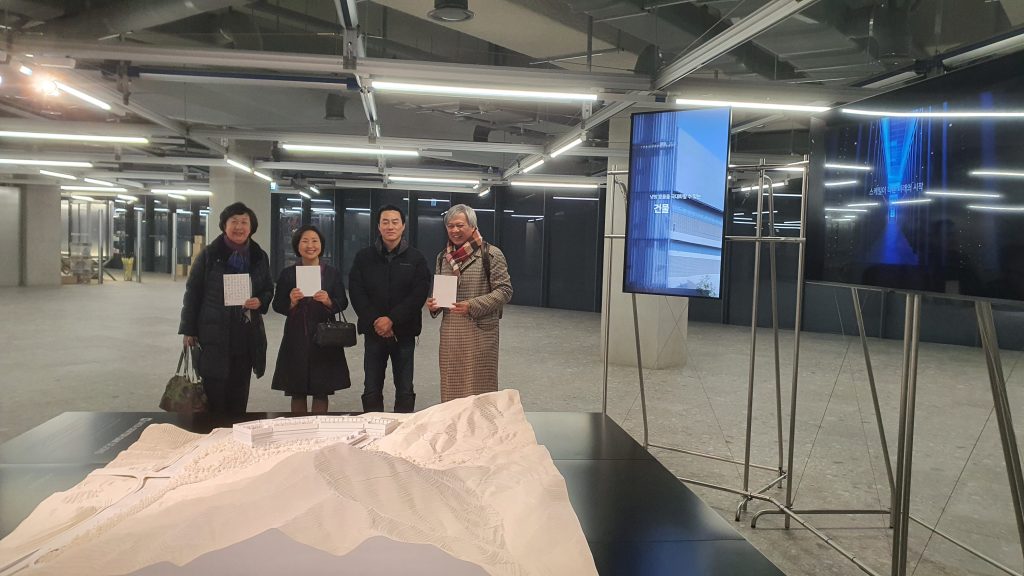
Figure1 Headquarters of NAVER Corp. (From left to right) Professor Yeong-Ran Park, Vice president, International Society for Gerontechnology, Kangnam University, Professor Hyun-Jeong Kim, Professor, School of Dentistry Seoul National University, CEO of Seoul Medical Design (SMD solution), Mr. Ok Sang-Houn, Leader of AI SaaS Business, NAVER Cloud, and Associate Professor Dr. Myo Nyein Aung, Principal Investigator of DIHAC study
Professor Myo was invited by Mr. Ok Sang-Houn, Leader of AI SaaS Business, NAVER Cloud to visit the headquarters of Naver Corporation in Seongnam City, Gyeonggi Province, Seoul Capital Area. The Naver Corporation is a South Korean internet conglomerate that operates the search engine Naver, the Korean version of Google. Mr. Ok gave a presentation on the CLOVA Care Call system at the 16th cross-cultural exchange meeting of the DIHAC project in April 2023. During the COVID-19 pandemic, Naver developed AI Care Call for the care of older people living alone. The AI chatbot based on HyperCLOVA technology make regular calls to registered seniors, asking about their daily life to prevent loneliness. In addition to the AI Care Calls, Naver’s embrace of AI technology integration, the seamless blend of digital twinning, robotics and innovative solutions has implications for smart and age-friendly environments.
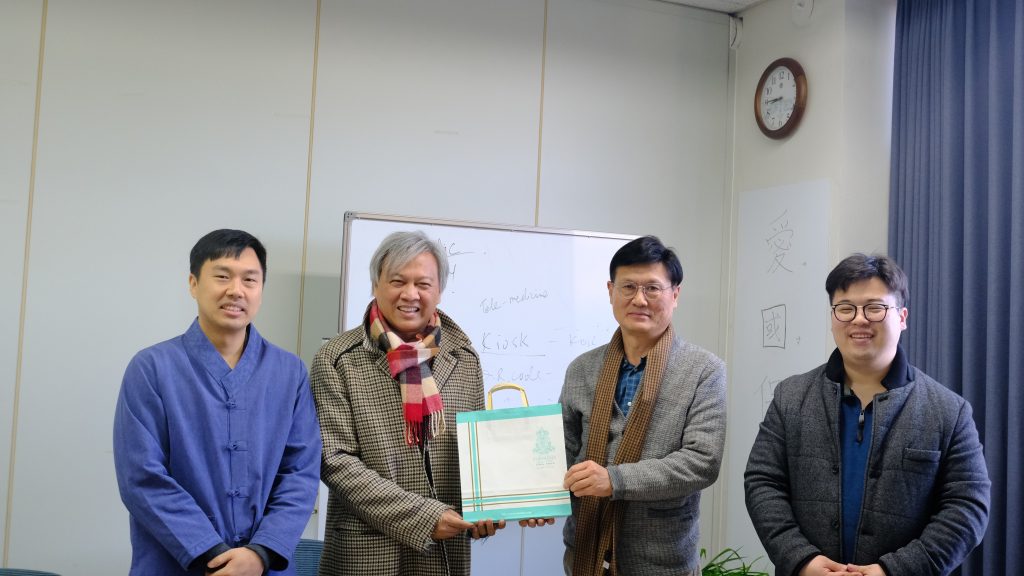
Figure 2 DIHAC researchers, Korean team and Japanese team working at Mirae campus, Yonsei University elaborating the implementation plan for Phase 3 Qualitative Study (From left to right) Dr. Haekweun Nam, PhD, Department of Preventive Medicine Wonju Medical College, Associate Professor Myo Nyein Aung, MD, MSc, PhD, Principal Investigator of DIHAC study, Professor Nam Eun Woo, MPH, PhD, Investigator, and adviser of DIHAC Korea team, Professor and Head of Department of Health Administration, Director of Yonsei Global Health Center, Dean, College of Software and Digital Healthcare Convergence, Dean, Graduate School of Health Sciences, Yonsei University, Republic of Korea; Dr. Hocheol Lee, PhD, Senior Researcher, Yonsei Global Health Center, Yonsei University, Republic of Korea
DIHAC research team conducted the third phase of the DIHAC qualitative study in the community to identify the cultural pattern, and contextual factors, making sense of what older persons in Republic of Korea materialize, say, do, think, and feel to reveal deeper beliefs and core values about digital inclusion and healthy aging. During the trip, Associate Professor Dr. Myo Nyein Aung visited Yonsei University, College of Software and Digital Healthcare Convergence, Dean office of Graduate School of Health Sciences, Digital Health Center in Gangwon Innovation Regional Platform, Department of Health Administration and Yonsei Global Health Center.
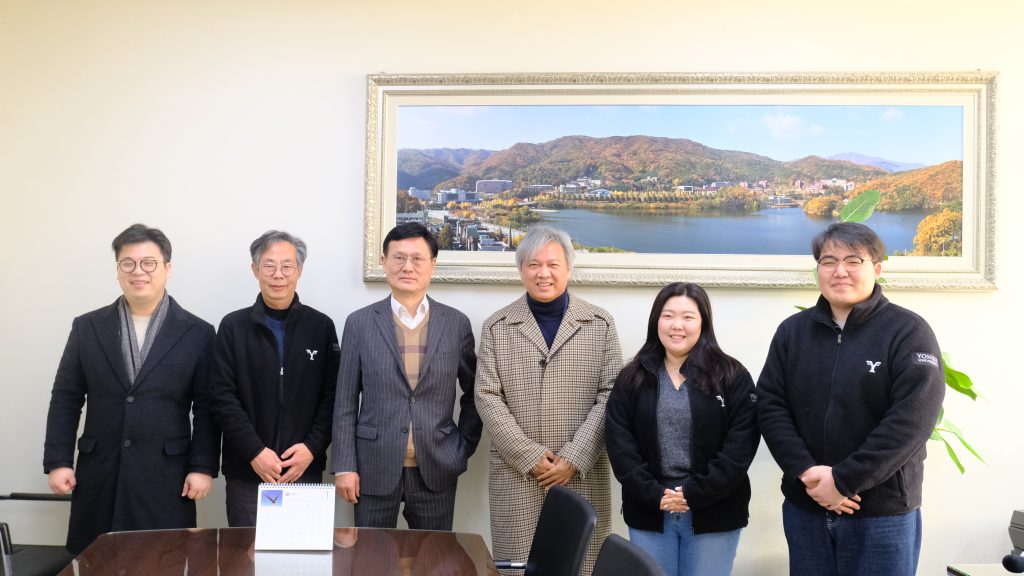 Figure 3 Dean of Graduate School of Health Sciences, Yonsei University
Figure 3 Dean of Graduate School of Health Sciences, Yonsei University
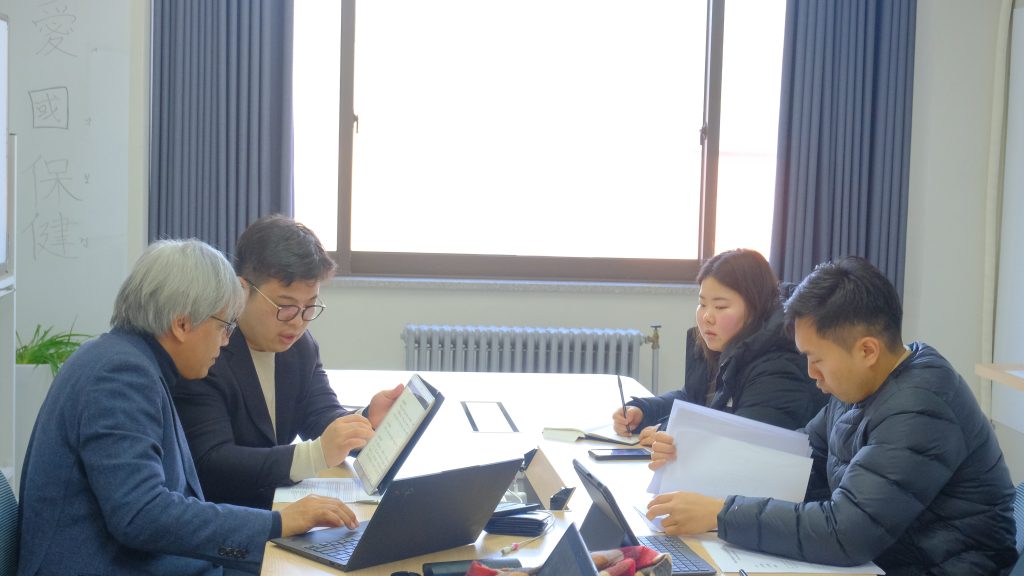 Figure 4 DIHAC researchers, Korea team and Japan team working at Mirae campus, Yonsei University summarizing the results after conducting Phase 3 Qualitative Study (From left to right) DIHAC PI Associate Professor Dr. Myo Nyein Aung, Dr. Hocheol Lee, Ms. Su Been Lim, Dr. Haekweun Nam.
Figure 4 DIHAC researchers, Korea team and Japan team working at Mirae campus, Yonsei University summarizing the results after conducting Phase 3 Qualitative Study (From left to right) DIHAC PI Associate Professor Dr. Myo Nyein Aung, Dr. Hocheol Lee, Ms. Su Been Lim, Dr. Haekweun Nam.
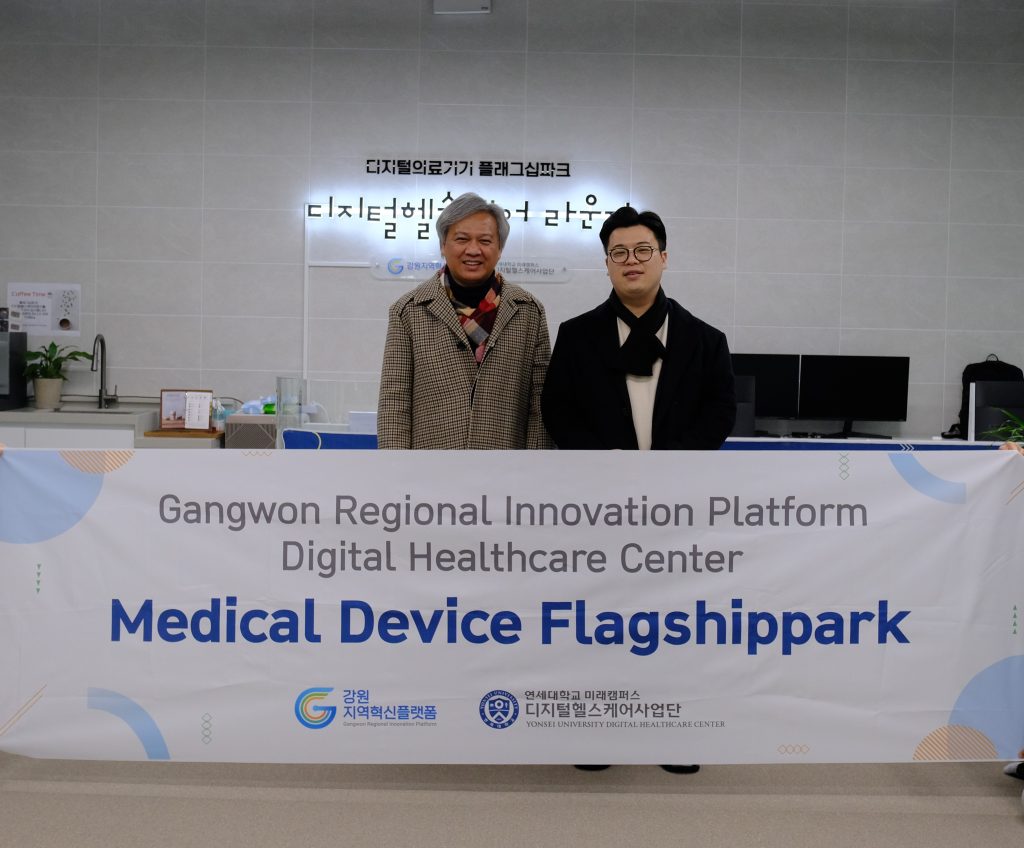 Figure 5 DIHAC study PI Associate Professor Dr. Myo Nyein Aung and DIHAC Korea team member Dr. Hocheol Lee at Gangwon Regional Innovation Platform Digital Healthcare Center “Medical Device Flagshippark”
Figure 5 DIHAC study PI Associate Professor Dr. Myo Nyein Aung and DIHAC Korea team member Dr. Hocheol Lee at Gangwon Regional Innovation Platform Digital Healthcare Center “Medical Device Flagshippark”
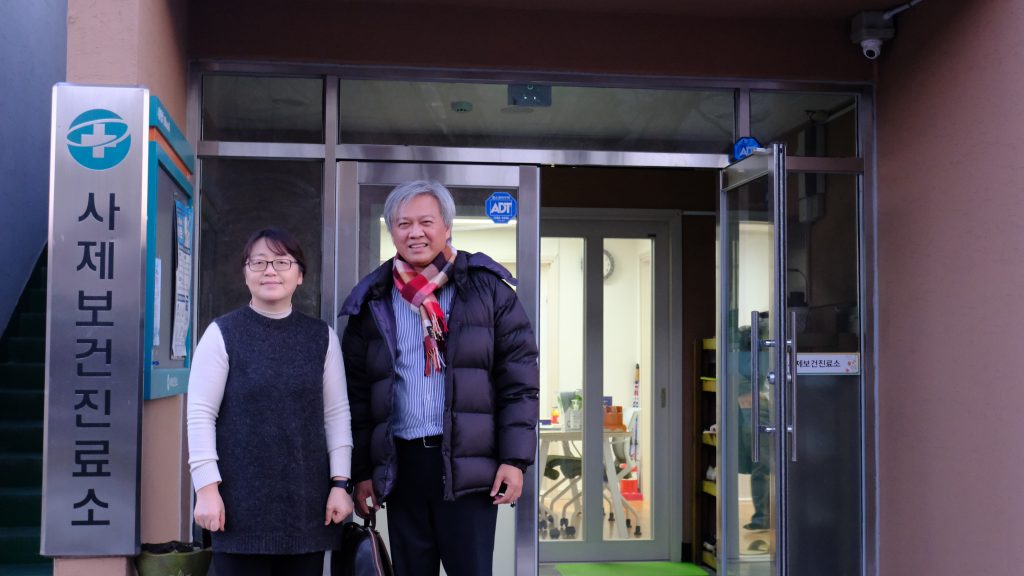 Figure 6 DIHAC study PI Associate Professor Dr. Myo Nyein Aung and Ms. Seokmi Hong Director of Saje Primary Health Care post in Wonju
Figure 6 DIHAC study PI Associate Professor Dr. Myo Nyein Aung and Ms. Seokmi Hong Director of Saje Primary Health Care post in Wonju
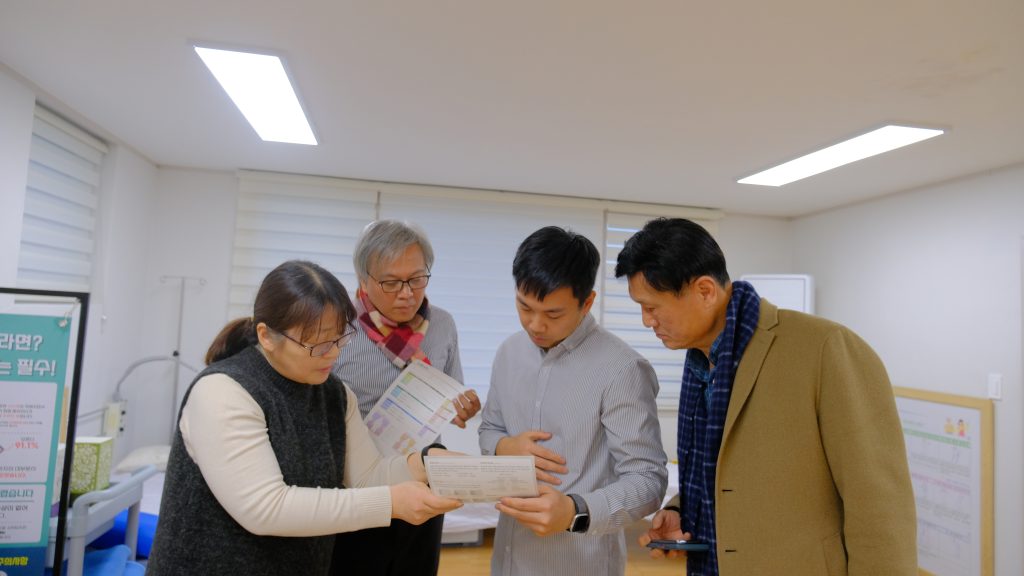 Figure 7 Saje Primary Health Care post in Wonju. (From left to right) Director of Saje Primary Health Care post Ms. Seokmi Hong,, DIHAC study PI Associate Professor Myo Nyein Aung, and DIHAC Korea team, Dr. Haekweun Nam and Dean Professor Eoo Wun Nam
Figure 7 Saje Primary Health Care post in Wonju. (From left to right) Director of Saje Primary Health Care post Ms. Seokmi Hong,, DIHAC study PI Associate Professor Myo Nyein Aung, and DIHAC Korea team, Dr. Haekweun Nam and Dean Professor Eoo Wun Nam
Another community visited was Saje primary health care post, Wonju, South Korea for observation of health and social care services, projects on telemedicine, mobile health care, and AI mediated wellness monitoring program for sustainable health promotion and monitoring of older persons. Community nurses from the primary health care post update and discuss patients’ status with doctors from the tertiary center via online video call. For sustainable care of the older persons, the mobile application “Today Health”, operated by Korean Government, provides customized remote health management based on frailty level and health status. The primary health care post also promotes digital literacy of older persons by educating them how to use the smart phones. Further details about telemedicine and AI-IoT are available at 19th DIHAC cross-cultural exchange meeting analysis report.
Republic of Korea, a dynamic and technology advanced country, has fully embraced the era of digital technologies. Walk down the streets of Seoul, Wonju, and other cities, we witnessed the widespread use of KIOSKs, smartphones, and other electronic devices. Although younger generations can easily adapt to digital technology innovations, older adults may face challenges in adopting rapid digitalization. DIHAC study aims to advocate the equity among older persons by identifying pathways to minimize the digital divide in access gap, skill gap and usage gap through cross-cultural empathy framework. Indeed, Korea stands at the forefront of digital innovation today and empowerment in bridging the grey digital divide is needed especially for the marginalized older population.
DIHAC study in the ROK is expected to identify empowerment model which enables digitally inclusive healthy ageing community in Korean context and share it with other countries preparing to invest healthy ageing.
